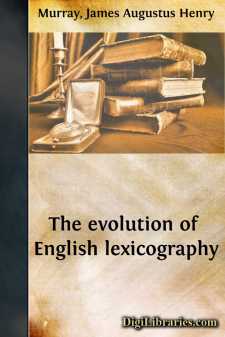Categories
- Antiques & Collectibles 13
- Architecture 36
- Art 48
- Bibles 22
- Biography & Autobiography 813
- Body, Mind & Spirit 142
- Business & Economics 28
- Children's Books 14
- Children's Fiction 11
- Computers 4
- Cooking 94
- Crafts & Hobbies 4
- Drama 346
- Education 46
- Family & Relationships 57
- Fiction 11829
- Games 19
- Gardening 17
- Health & Fitness 34
- History 1377
- House & Home 1
- Humor 147
- Juvenile Fiction 1873
- Juvenile Nonfiction 202
- Language Arts & Disciplines 88
- Law 16
- Literary Collections 686
- Literary Criticism 179
- Mathematics 13
- Medical 41
- Music 40
- Nature 179
- Non-Classifiable 1768
- Performing Arts 7
- Periodicals 1453
- Philosophy 64
- Photography 2
- Poetry 896
- Political Science 203
- Psychology 42
- Reference 154
- Religion 513
- Science 126
- Self-Help 84
- Social Science 81
- Sports & Recreation 34
- Study Aids 3
- Technology & Engineering 59
- Transportation 23
- Travel 463
- True Crime 29
The evolution of English lexicography
Description:
Excerpt
The Evolution of English Lexicography
BY JAMES A.H. MURRAY
M.A., LL.D., D.C.L., PH.D.
When the ‘Act to facilitate the provision of Allotments for the Labouring Classes’ was before the House of Commons in 1887, a well-known member for a northern constituency asked the Minister who had charge of the measure for a definition of the term allotment, which occurred so often in the Bill. The Minister somewhat brusquely told his interrogator to ‘look in the Dictionary,’ at which there was, according to the newspapers, ‘a laugh.’ The member warmly protested that, being called upon to consider a measure dealing with things therein called ‘Allotments’, a term not known to English Law, nor explained in the Bill itself, he had a right to ask for a definition. But the only answer he received was ‘Johnson's Dictionary! Johnson's Dictionary!’ at which, according to the newspapers, the House gave ‘another laugh,’ and the interrogator subsided. The real humour of the situation, which was unfortunately lost upon the House of Commons, was, that as agricultural allotments had not been thought of in the days of Dr. Johnson, no explanation of the term in this use is to be found in Johnson's Dictionary; as, however, this happened to be unknown, alike to the questioner and to the House, the former missed a chance of ‘scoring’ brilliantly, and the House the chance of a third laugh, this time at the expense of the Minister. But the replies of the latter are typical of the notions of a large number of persons, who habitually speak of ‘the Dictionary,’ just as they do of ‘the Bible,’ or ‘the Prayer-book,’ or ‘the Psalms’; and who, if pressed as to the authorship of these works, would certainly say that ‘the Psalms’ were composed by David, and ‘the Dictionary’ by Dr. Johnson.
I have met persons of intelligence who supposed that if Dr. Johnson was not the sole author of ‘the Dictionary’—a notion which, in view of the ‘pushfulness’ wherewith, in recent times, Dictionaries, American and other, have been pressed upon public notice, is now not so easily tenable—he was, at least, the ‘original author,’ from whose capacious brain that work first emanated. Whereas, in truth, Dr. Johnson had been preceded by scores of workers, each of whom had added his stone or stones to the lexicographic cairn, which had already risen to goodly proportions when Johnson made to it his own splendid contribution.
For, the English Dictionary, like the English Constitution, is the creation of no one man, and of no one age; it is a growth that has slowly developed itself adown the ages. Its beginnings lie far back in times almost prehistoric. And these beginnings themselves, although the English Dictionary of to-day is lineally developed from them, were neither Dictionaries, nor even English. As to their language, they were in the first place and principally Latin: as to their substance, they consisted, in large part at least, of glosses....


